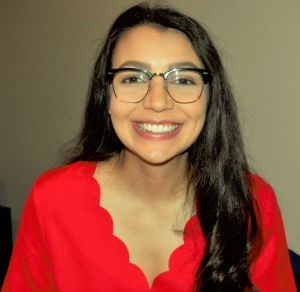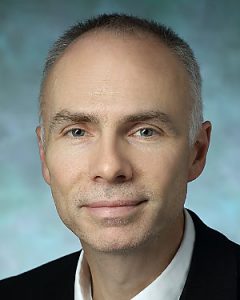As a sophomore at the University of Arizona in Tucson, Sarah Graham was involved in a serious cycling accident that changed her entire educational trajectory.

“It was then that I really fell in love with research,” Graham says. “I completely changed my major, my career path.”
Graham began working in a lab and completed a post-baccalaureate program, which solidified her love of research and desire to go to graduate school. She is now in her second year of doctoral study in cellular and molecular medicine at the Johns Hopkins Institute for Basic Biomedical Sciences.
With her acceptance to Hopkins, Graham, the daughter of Mexican immigrants and a Robert E. McNair Scholar, also learned she’d received the IBBS Director’s Fellowship.
“I had a little bit of imposter syndrome when I got my acceptance to Hopkins, but having this fellowship awarded was a big confidence booster that this was a place that I deserved to be and fit in,” Graham says. “It was a green flag to me because it’s about helping underrepresented minority students who are passionate in mentorship and giving back to the community. I think that a lot of times in academia, we get really focused on just the science, but the goals and values of the fellowship were a contributing factor in saying, ‘Hopkins is an institution that I want to associate with.’”
Initially, the fellowship helped alleviate the financial burden of moving from Arizona to Maryland. Now, Graham plans to use the funds to support her research, as well as conference travel and attendance. She has several experiments planned this year.
“Things that normally would be hurdles, I don’t feel as stressed about because I have the funding from the fellowship,” she says.
Launched in 2021 and funded by donations from the IBBS Advisory Council, the fellowship is part of an effort to attract more diverse graduate students to basic science graduate programs in the School of Medicine.

The school’s graduate programs have long recognized a need to try to advance in the areas of diversity, equity, and inclusion, says James Berger, director for the Institute for Basic Biomedical Sciences.
“Many studies have shown that groups make better decisions, come up with better ideas, and choose data more wisely if they have a diversity of opinions and a diversity of backgrounds within them,” he explains. “We felt very strongly that it was important for us to make sure that our graduate pool of students as a whole properly reflects the diversity of backgrounds and people that are in this country. Also, we recognize that not everybody coming from some of these groups has had the same advantages in terms of being able to make it where they are.”
David Turock, chair of the IBBS Advisory Council and a supporter of the fellowship, credits his mother with fostering his appreciation for diversity and the desire to do more to advance it.
“I was raised from a very young age to understand that women work twice as hard to get as far as a man does,” he says. “There are not the same opportunities, particularly for women and minorities. And, if you want to have a unique perspective on things, you have to have that diversity of background and experience.”

He also finds supporting graduate students particularly important, noting young researchers approach problems with fresh perspectives and challenge the standard ways of doing things.
“I think that funding students is actually a way of promoting new ideas,” Turock explains.
Berger agrees, adding graduate education is much undervalued for the return it yields. Graham’s research, for example, focuses on improving understanding of the genetic alterations of PanINs, the pre-cancerous lesions that can cause pancreatic cancer. Her work includes characterizing genetic alterations using whole exome sequencing — a genomic technique for sequencing all the protein-coding regions of genes in a genome — and 3D modeling with the ultimate goal of developing better early detection methods.
“Graduate students, as well as post-doctoral fellows, are the backbone of the scientific discovery enterprise here in the United States. They don’t make a lot of money, by many standards, but they work incredibly hard and they make terrific discoveries,” Berger says, adding that as federal and institutional funding sources dwindle, the goal should be to double down in support of graduate education. “These fellowships recognize that. This is a particularly important group of individuals who need attention. It’s a small part that we’re doing, but it needs to be done. More still needs to be done. We’re trying to enrich our programs to make sure we’re doing the best science possible.”
Topics: Friends of Johns Hopkins Medicine, Johns Hopkins Medicine, Support Scholars